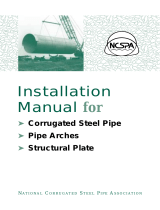MB Mastic Asphalt (MGA-40)
Assembly instructions
MULTIBETON GmbH, Heuserweg 23, 53842 Troisdorf-Spich, Phone +49224125200-0, Fax +49224125200-99
05/2023
Updates and additions reserved without notice.
Special installation instructions
Due to the high processing temperature of mastic asphalt, the
following points must be observed:
01. The calculated heating circuit lengths from the MULTIBETON
design must be strictly observed.
02. A maximum of one heating circuit per connection may be
connected to the heating manifold. Y-pieces must not be
used.
03. If the MB-Euro System pipe is damaged during installation or
mechanical damage occurs due to external impact, the affec-
ted heating circuit must be re-installed before the mastic
asphalt is laid.
04. After the heating circuits have been laid, the construction
site must be closed to third parties until the mastic asphalt
has been installed. To avoid damage, no work may be carried
out by e.g. contactors, electricians, drywall builders, etc. The
installed system may no longer be entered.
05. After the mastic asphalt has cooled down, all heating circuits
must be checked for leak tightness in accordance with the
applicable standard.
06. During the placement of the asphalt, the MB-Euro System
pipes must be constantly flushed with fresh cold water below
20 °C. This requires an upstream pressure of 4 bar at the
manifold inlet or a flow pressure of approx. 2 bar; if neces-
sary, the pressure reducing valve and flushing filter must be
removed. If the house connection pressure is less than 6 bar,
the cooling water is provided by the MB-KWS (cooling water
station for MGA) or a standpipe.
07. Only suitable pressure hoses with secured hose clamps
should be used.
08. The laying temperature of the mastic asphalt must never
exceed 230 °C when it is applied.
09. Only MB Euro System pipes and MULTIBETON manifolds are
used.
10. All valve inserts, flow indicators or constant flow regulators
must be replaced with end plugs before the mastic asphalt is
placed.
11. The supply line of the manifold is designed with min. 1”
without any taper! The manifold outlet must also be 1”, with-
out any resistances, so that a free flow or outflow is possible.
A cooling water circuit is not permitted. The paths of the
inlet and outlet hoses must be kept as short as possible and,
if necessary, protected by bridges.
12. A maximum of two manifolds may be open for flushing at the
same time.
13. After completion of the asphalt paving, the heating circuits
must be flushed with cold water for at least 90 minutes.
14. After the flushing process, it is necessary to ensure that the
drains of the manifolds or the ball valves remain open so
that any water that is heated later can still expand.
15. It must be ensured that all heating circuits of the laying sec-
tion as well as the adjacent heating circuits, with or without
cooled asphalt, are permanently flushed with fresh cold
water during the entire laying and cooling phases of the
asphalt.
Further recommendations & tips
01. If the mastic asphalt is laid in one layer, shading/uneven-
ness of the heating circuits will become visible.
02. For sanded mastic asphalt, it is recommended to lay it in two
layers, as otherwise a colour difference in the area of the
system pipes is to be expected.
03. The minimum layer thickness when applying the mastic
asphalt is 2.5 times the grain size (8 mm grain = 2 cm mastic
asphalt).
04. The maximum layer thickness when applying the mastic
asphalt is 5 times the grain size (8 mm grain = 4 cm mastic
asphalt).
05. The weight is approx. 25 kg/m² per 1 cm construction height.
06. If a linoleum floor or other vapour-impermeable covering is
to be installed, the mastic asphalt must first be provided
with a suitable levelling compound (usually 5 mm thick) as
levelling and moisture absorption.
07. In the case of two-layer insulation, the top insulation layer
(approved for mastic asphalt) should have the same thickn-
ess as the mastic asphalt. The temperature on the underside
of the insulation board must not exceed 150 °C for 20 minu-
tes. The bottom insulation layer should also be heat-resi-
stant.
08. The pipe coverage must be at least 15 mm.
09. The compressibility of the insulation layers must not exceed
3 mm.
10. Windows, doors and building services installations must be
protected from heat during the laying and cooling phase of
the asphalt.





